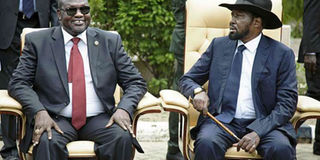Kenya may soon be forced to freeze assets of South Sudanese warlords

This photograph dated April 29, 2016 shows South Sudan's First Vice-President Riek Machar (left), and President Salva Kiir in Juba. PHOTO | ALBERT GONZALEZ FARRAN | AFP
What you need to know:
Something is not right.
As long as South Sudanese generals and politicians use Kenyan banks and residences to hide their loot, a question must be asked about this nation’s commitment to the plight of refugees within Kenyan soil.
The first Sudanese refugees arrived in Kakuma Camp in 1993. The sight of hundreds of extremely tall, dark young men, disorientated and dehydrated after a trek of several months, was something I won’t forget. The camp soon took on a life of its own, however, as the civil war that dragged on wasted lives and spoiled hopes. Hundreds of young boys were taken off to the USA by the UNHCR. Most, however, were left in hot, overcrowded classrooms in Kakuma trying to acquire an education that might help them rebuild their country one day.
Eventually a peace agreement was reached with the Khartoum government and in January 2011 I had the privilege of observing South Sudan’s Independence Referendum. Formal independence followed in July of the same year but the young country has hardly known a month of peace ever since. It’s a tragic story. The recent war between the forces of Salva Kiir and Riek Machar has left tens of thousands dead, 2.5 million displaced and 5 million in need of food assistance. That is South Sudan’s five year history.
LOOTING COFFERS
According to the Washington-based Sentry organisation, the fighting is all about looting the young nation’s coffers. Sentry claims that this is not an ethnic conflict but a resource-based one that only exploits ethnic divisions with the aim of plundering. George Clooney is the founder of Sentry and his researchers spent two years trekking the globe locating South Sudan’s stolen wealth in foreign banks, luxury mansions and prime real estate. They used satellite imagery to examine the overseas property and images posted by the warlords’ offspring living luxuriously were found on their Instagram and Facebook accounts.
What is most disturbing about the 66-page report titled “War Crimes Shouldn’t Pay” is that Kenya is hosting Machar and Kiir and the top army generals in Lavington, Runda and Nyeri estates. While Kiir and Machar are avowed enemies, their million dollar mansions are within a stone’s throw of each other in leafy Lavington. Sentry claims that KCB moved $3 million through General Riak’s personal bank account between 2012 and 2016. The same bank moved $367,000 for General Riak last year even when he was named as part of a UN assets freeze.
While the politicians and military scheme to kill and loot from Nairobi, 800 kilometres away, thousands of their displaced citizens flee across the Nadapal border every week seeking refuge in Kenya. This anomaly is missed by Kenyans. Kakuma camp has reached saturation point and a new camp has just opened at Kalobeyei. While thousands of refugees eke out a miserable existence in Turkana, the men responsible for their suffering live it up in Nairobi.
Something is not right. As long as the generals and politicians use Kenyan banks and residences to hide their loot, a question must be asked about this nation’s commitment to the plight of refugees within Kenyan soil. Sentry has asked Kenya and other countries to ensure that their banks are not facilitating money laundering. They may soon be forced to freeze the assets of the warlords in the manner in which they have frozen those of alleged terrorist outfits. That is the least the country can do for the suffering South Sudanese.
[email protected];@GabrielDolan1





